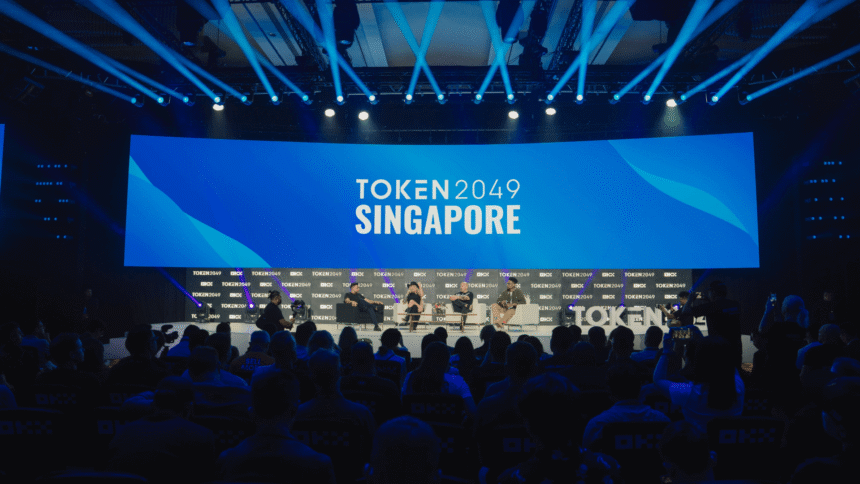Token2049 Crypto Trends 2024: Quantum, DeAI, Stablecoins
Token2049, held at Marina Bay Sands in Singapore, set a new landmark for the cryptocurrency and technology industry in 2024. The event attracted more than 25,000 attendees, 300 speakers, and over 500 exhibitors, reflecting unprecedented growth and engagement in the sector. Organizers highlighted the event as a global platform at the intersection of crypto, artificial intelligence (AI), decentralized finance, and emerging Web3 applications. Reporting via Forbes.
Background: Record-breaking Token2049 Event
Token2049’s expansion was marked by international participation and a robust agenda. The event’s co-founder, Alex Fiskum, noted that the gathering “bridges East and West, creates a truly global platform, and captures momentum that will ripple across the industry,” according to Forbes. Sessions addressed urgent issues, including scalable blockchain infrastructure, financial innovation, and responsible integration of crypto and AI technologies.
The conference became a launchpad for industry announcements and sector-defining discussions. Participants described Token2049 as a “crypto wave generator,” with keynote panels often impacting market narratives and investor sentiment in real-time.
Major Crypto Trends from Token2049
Quantum Readiness: Quantum computing and its impact on existing blockchain protocols were central themes. Charles Edwards, Founder of Capriole Investments, underscored the need to develop quantum-proof solutions. He stated, “We need to upgrade Bitcoin to be quantum proof within the next couple of years. Otherwise the entire system could be at risk.” Concerns about potential vulnerabilities in elliptic curve cryptography are accelerating the urgency for post-quantum cryptographic standards.
AI and Agentic Systems: Decentralized AI (DeAI) initiatives aim to democratize access to artificial intelligence resources, moving away from corporate monopolies. At Token2049, discussions highlighted open-marketplaces for compute resources and the rise of “agentic systems”—AI-powered agents capable of executing transactions, negotiating contracts, and even managing stablecoin payments. These innovations point toward a future where AI is both a tool and an economic actor in blockchain ecosystems.
Decentralized Robotics: Robotics platforms, such as BitRobot, showcased collaborations with institutions like Google DeepMind and UC Berkeley. BitRobot leverages smart contracts and distributed incentives to engage global contributors, integrating AI with tokenized rewards and pushing the boundaries of collaborative robotics research.
Real-World Asset (RWA) Tokenization: The expansion of RWAs was a focal point, as entrepreneurs demoed blockchain-backed tokenization of property, bonds, equities, and luxury assets such as fine watches. Atul Khekade, co-founder of XDC, described tokenized ownership as a way to “unlock liquidity in markets that were once closed,” opening new channels for both institutional and retail investment.
Stablecoins: Stablecoins dominated discussions as central to both decentralized finance (DeFi) and the integration of traditional finance (TradFi) with blockchain. Arthur Hayes commented, “Stablecoins are not just plumbing. They are the Trojan horse that could reshape global finance.” Their increasing adoption underscores stablecoins’ importance as both a bridge and a foundation for global economic connectivity.
Market Reactions and Industry Impacts
Token2049’s themes also touched on tokenized identity, the evolution of AI companions, and the growing acceptance of digital assets as part of corporate treasuries and consumer markets. Wristcheck’s integration of crypto payments into luxury watch trading signaled digital assets’ tangible impact on high-value markets, supported by a global luxury watch market(Statista) exceeding USD 26.5 billion in 2024. Additionally, Telegram’s rollout of financial services, including tokenized U.S. equities, spotlights a new wave of “super apps” integrating both messaging and investing.
Fintech firms at the event emphasized the shift from speculative trading towards responsibility, long-term investing, and transparency. Executives from Revolut and Liquid Loans described the necessity for trust, regulatory alignment, and customer-centric strategies to support mainstream adoption and sustainable growth in the sector.
What’s Next for Token2049 and the Crypto Industry
Forecasting the future, participants at Token2049 identified prediction markets, composable infrastructure, and East-West industry collaborations as critical areas for development. The conference highlighted that quantum readiness, DeAI, stablecoins, decentralized robotics, and RWA tokenization now form the blueprint for Web3 innovation and mainstream acceptance.
The event demonstrated that 2024’s top Token2049 crypto trends are not isolated experiments, but foundational components for the finance, technology, and cultural landscapes of the next decade. As the lines blur between traditional finance, blockchain, and AI, Token2049 offers a snapshot of the sector’s accelerating maturity and global relevance.
Read more in our coverage of cryptocurrency trends and events.
Sources:



















